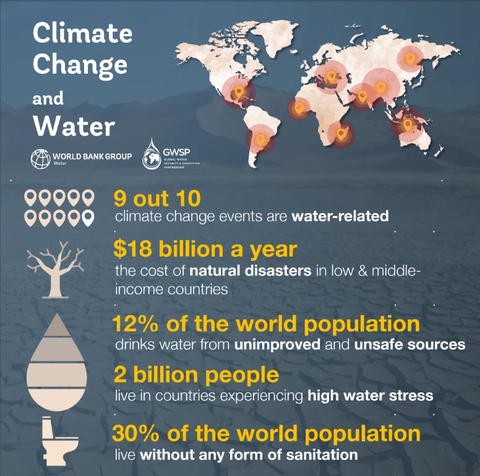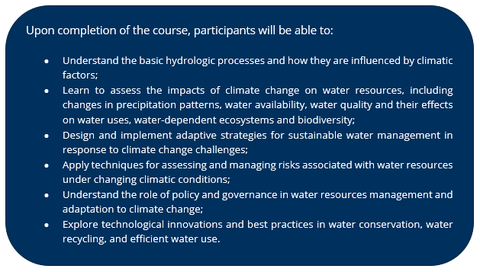93rd UNEP/UNESCO/BMUKN International Short Course - Navigating Water Challenges: Climate Change and Resource Management (SC93)
Duration: October 05, 2025 – November 09, 2025 (on-site in Dresden)
Interactive full-time course with intense personal guidance and support for building lasting networks in a peer-group of international professionals.
Motivation
Water is a fundamental resource that sustains life, ecosystems and human societies. But water is more than a resource. It's a lifeline for achieving the Sustainable Development Goals (SDGs) that underpin global progress. Its importance cuts across multiple sectors, from health and agriculture to energy and infrastructure. At the heart of SDG 6 is the imperative to ensure universal access to clean water and sanitation, a basic human right. This access is not only about meeting basic needs, but also about empowering communities, ensuring biodiversity, driving economic growth, and promoting resilience in the face of climate change.
The growing impacts of climate change pose significant challenges to the availability, quality, and management of water resources worldwide. Changes in temperature, precipitation patterns and extreme weather events are altering the hydrological cycle, affecting water supply and demand, and exacerbating water scarcity and quality issues. These challenges are further complicated by increasing population pressure, urbanization, agricultural and industrial activities, which increase demand for water and stress already fragile water systems.

Figure 2: Water and Climate Change (Source: World Bank Group, 2023).
To effectively address these complex issues, there is an urgent need for professionals with advanced scientific knowledge and practical skills in water resources management and climate change adaptation. This course is designed to meet this need by providing participants with a deep understanding of the interplay between hydrological processes and climate dynamics, and equipping them with the tools to develop and implement effective management strategies.
Course concept and objectives
This comprehensive course program examines the complex relationship between water resources and climate change. The short course is structured around a comprehensive exploration of the scientific, technical and policy dimensions of water resources management in the context of climate change. It combines theoretical knowledge with practical applications, using a multidisciplinary approach to ensure a holistic understanding of the issues at hand. Participants will explore the scientific principles of hydrology and climate systems, analyze the impacts of climate change on water resources, and develop strategies for sustainable water management. Through this blend of theoretical and practical knowledge, this course provides participants with the tools to assess risks, design adaptive measures, and implement effective water management practices in the face of climate variability and change. The short course will explore critical topics such as:
- Examination of how climate change impacts these processes and the subsequent effects on water resources and water-dependent ecosystems.
- Planetary boundaries and doughnut economics.
- Water challenges and management in the context of the SDGs.
- Impact and risk assessment of climate change on water resources and water-dependent ecosystems.
- Adaptive water management strategies.
- Review of international and national policies and regulatory frameworks for water resources and climate change.
Objectives
With the course-accompanying creation of individual Post-Training Action Plans (PTAPs), participants prepare themselves to transfer knowledge acquired in the training into their professional action spaces.
Target groups
This course is aimed at qualified professionals who prepare and implement political decisions and practical measures in ministries, authorities, local government and non-governmental institutions of developing countries (including emerging economies) working on resource sustainability and water issues as well as sustainable societal development.
We expect a high motivation to explore concepts for water management and climate change and to work towards implementing them. A first university degree (e.g., BA, BSc) in a related field is essential. Adequate communication skills in the English language and the nomination by the delegating institution for this full-time course are mandatory.
What makes participating in this course impactful?
- Experience of the CIPSEM team in conducting engaging, meaningful trainings considering the challenges in developing countries and emerging economies.
- A full-time, 4-weeks learning experience combining classroom sessions, excursions, and group work with guided self-study units.
- Renowned international and German facilitators.
- Boost of motivation through experience sharing and bonding with fellow experts.
- Participants become part of a large international network of environmental experts and leaders (more than 2 800 alumni from 146 countries)
- Transfer of the gained knowledge and skills though mentored development of post-training action plans.
- Alumni of this course can apply for one of several innovation fellowships supporting the implementation of the post-training action plan with €2000.
Fellowship opportunities
The program can award 16 fully funded fellowships covering accommodation in comfortable single studio apartments, local public transport, and all tuition fees (including excursions). Also included are round-trip flights from the participant's country of origin to Dresden, insurance, and a contribution of €550 toward living expenses.
Five additional, partial, fellowships can be awarded among those applicants, who are able to contribute transportation to and from Dresden, insurance, and living expenses other than housing. The partial fellowships include housing in comfortable single studio apartments, public transportation, and all tuition fees (including excursions).
For these partial fellowships, also applicants who currently reside in a non-DAC country are eligible, if their origin and (prospective) area of professional engagement is in a DAC country.
Application and participation
Qualified professionals are welcome to apply for this training from 25 February until 01 April 2025 on CIPSEM’s online application portal. The Steering Committee selects 21 (16+5) participants of this course by June 2025. Only selected participants will be informed via email. Successful participants are awarded a Certificate of Proficiency in Navigating Water Challenges: Climate Change and Resource Management.
Please note that the duration stated at the beginning corresponds to the financing period. This includes the course period from October 09, 2025 – November 05, 2025, as well as four arrival days before the start of the course and four departure days after the end of the course.
You can access the online application portal via the following link: https://crm.bu.tu-dresden.de/ausschreibung?0&call=CIPSEM2025-SC93
Before applying, please also take a look at our hints on application, explanations regarding the application portal and answers to frequently asked questions. For information on other courses, please visit https://tud.de/cipsem/upcoming.
► If you have an important question that is not addressed on our website or in the help texts within the application form, please contact us at . Before reaching out, we ask you to check the resources provided thoroughly.


